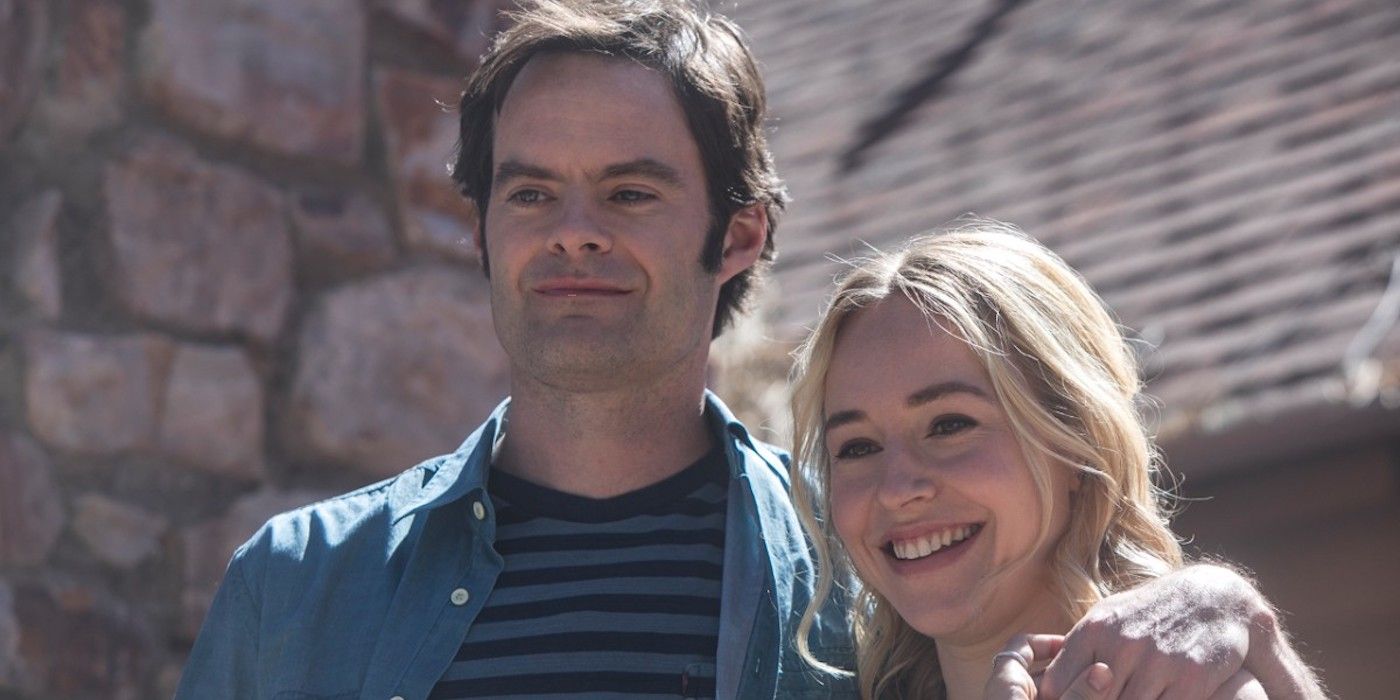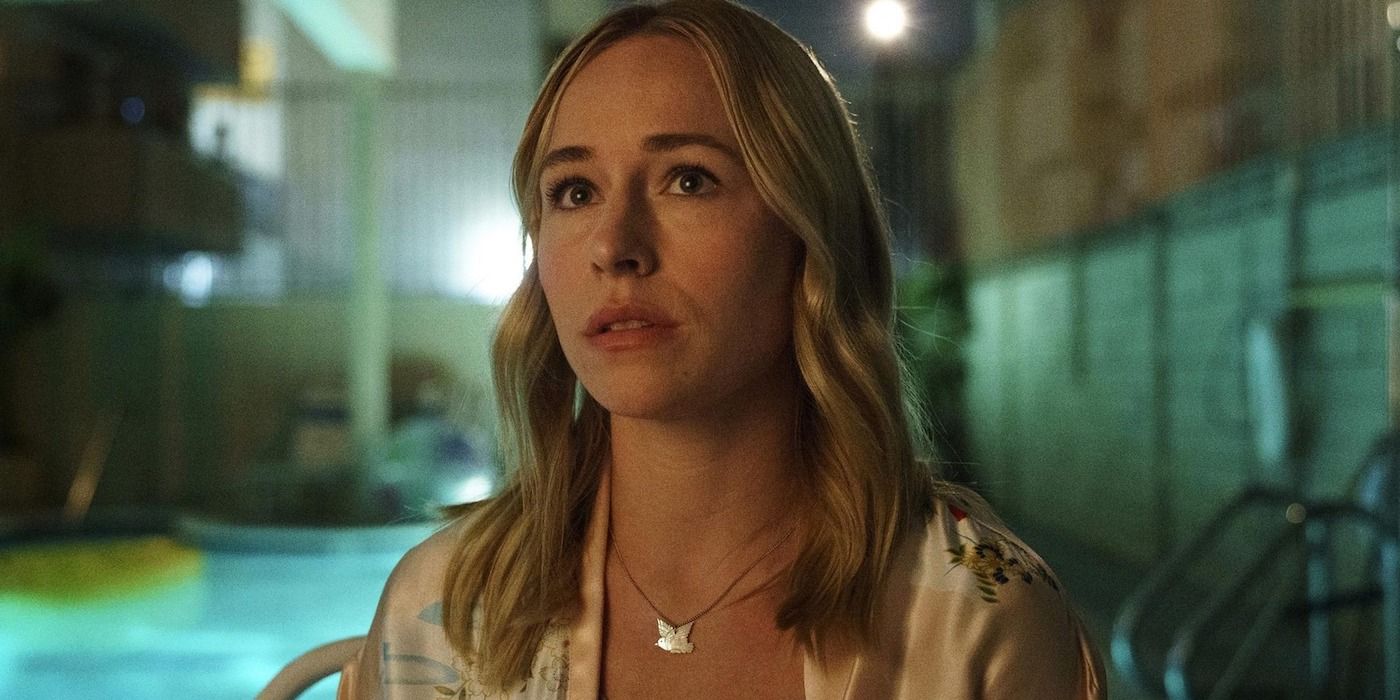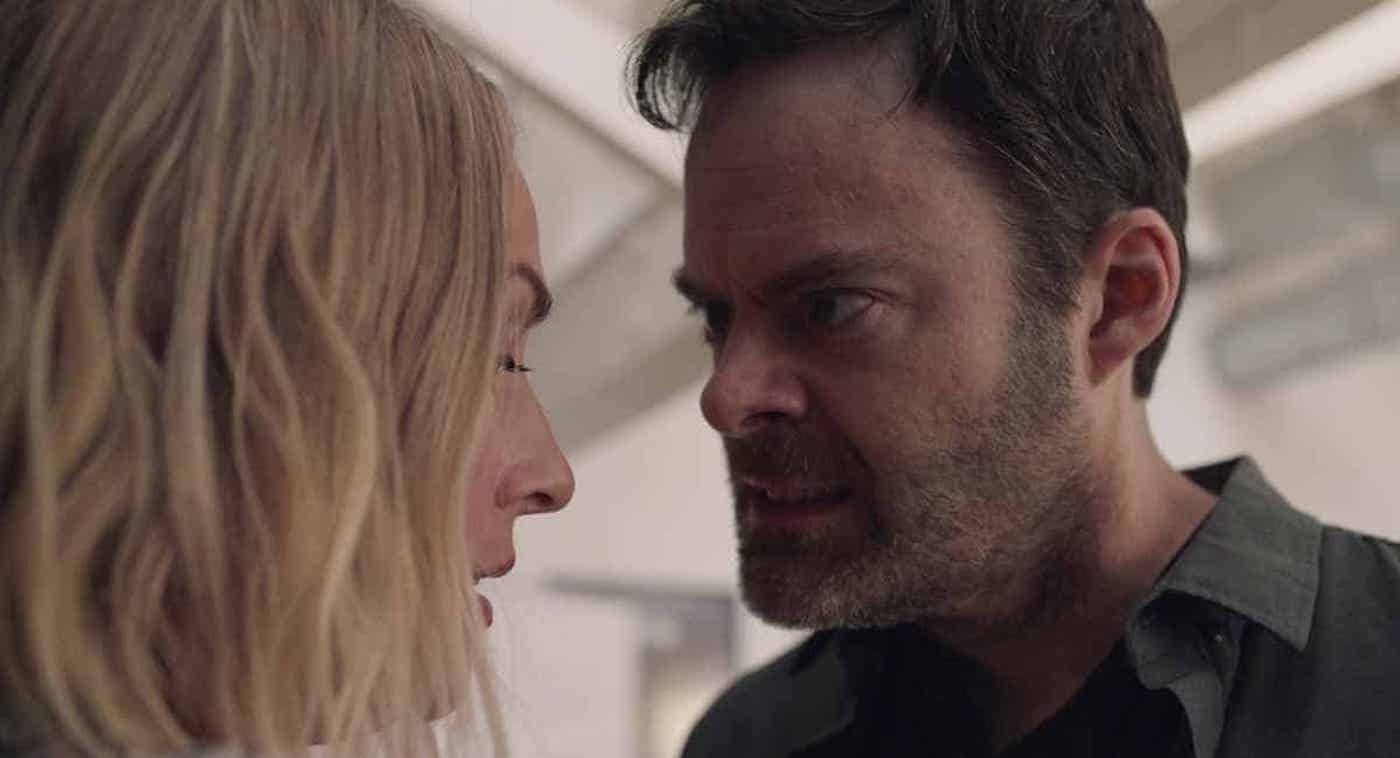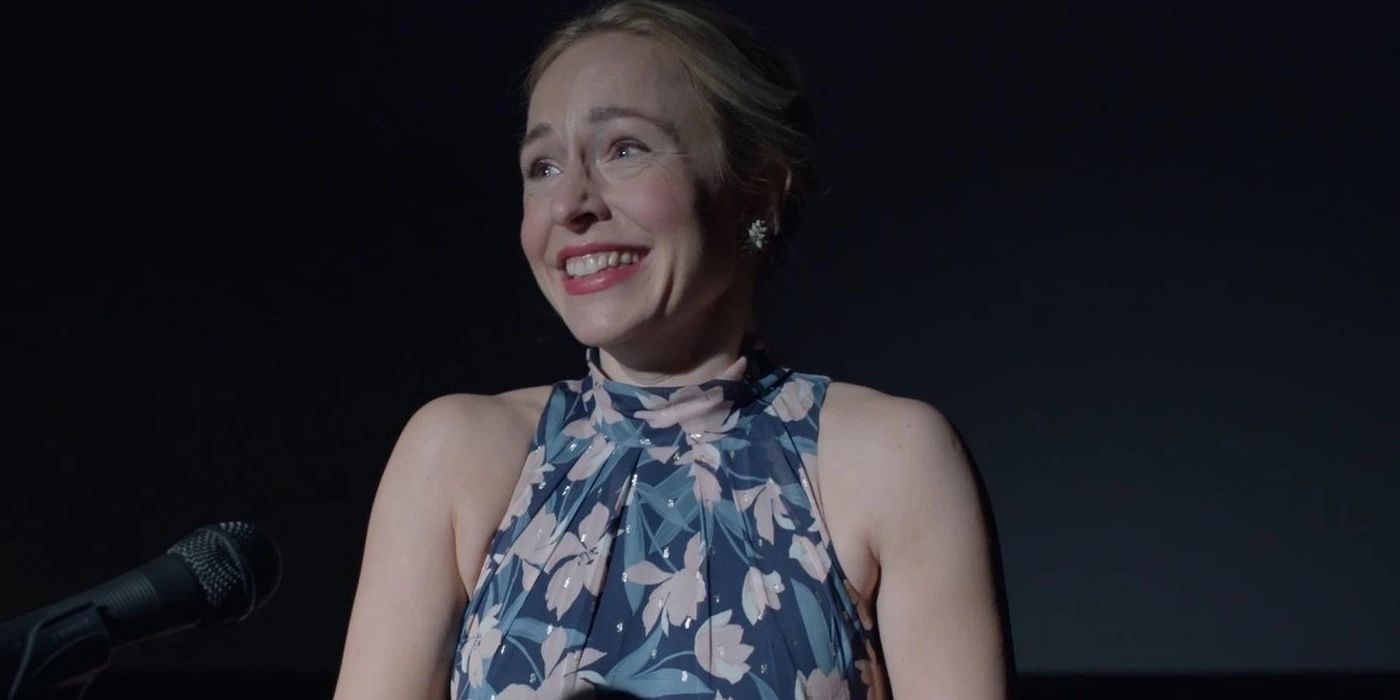Editor's note: The below article contains spoilers for Season 3 of Barry.In Season 3 of Barry, HBO’s actor-hitman dramedy (though the comedy part of that portmanteau is becoming less and less prominent as the series progresses), Sarah Goldberg’s Sally morphs from a narcissistic but essentially harmless artist with intense theater-kid energy to a rage-filled force of destruction, fueled by unbearable disappointment and the very particular cruelty that a life in the arts can inflict and instill. Through Goldberg’s astonishing performance, Sally becomes a mirror for Barry (Bill Hader) — someone driven to commit terrible acts by fury and a desperate need for validation, love, and self-preservation. In tracing her trajectory from Season 1’s optimistic and somehow charming self-absorption through to the devastation of Season 3’s finale, it becomes clear how her journey mirrors Barry’s — both the character and the show — on the descent into darkness.
The logline for Barry sounds like the set-up for a groaner of a punchline: A hitman walks into an acting class. But instead of knocking them all dead (with either his talent or his very particular set of skills), he finds that the exercises, scene work, variably-talented classmates, and self-pleased guidance of teacher Gene Cousineau (Henry Winkler) make him want to be something new. What begins as a dark comedy spirals over the course of three seasons (with a fourth on the way) into an examination of selfhood, the possibility (or impossibility) of change and forgiveness, and the effects of unprocessed rage and trauma. While Barry and his bloody exploits are at the center of the show and its questions about authenticity, guilt, and violence, his girlfriend, Sally, is living out her own mirrored version of this journey through the highs and lows of her artistic career, where she is “fucking drowning” but cannot even imagine swimming to shore.
In Season 1, Sally is primarily a part of the show’s central joke. An archetypical pretty, blonde, bubbly California actress, played by Goldberg with a winning sunniness, she becomes an embodiment of Barry’s desperate quest to leave the killing behind him. If he can get Sally to love him, maybe that would mean there is something within him worth loving. But Sally also embodies other facets of the archetype: desperation to succeed, a neurotic need to be liked (or, more accurately, admired), and self-absorption so blinding she can't see that there is something deeply fishy about her new classmate-cum-boyfriend. She is the mirror he is looking for: Barry desperately wants to be seen as the person he was trying to become, and she is too self-involved to see him for who he already is.
But just as Season 2 turns its premise inside out by making Barry functionally unable to kill, it deepens Sally, making her neuroses that, until this season, could have been chalked up to an actor’s particular brand of high-strung energy more nuanced. This season sees her writing a scene about leaving the abusive marriage that she fled before coming to LA, first as a “you-go-girl” scene of empowerment, then as something quieter and less satisfying but ultimately closer to the truth. This glimpse into what drives Sally’s consuming need to perform, to try on other identities, and to be adored from a safe distance, makes her character more complex and shines a new light on her least-admirable traits. It also heightens our disappointment (and her own underlying self-loathing) when the performance finally arrives and she spontaneously reverts to the scene’s old version: showier, safer, and untrue. Season 2 gives Sally both bravery and cowardice; it helps us empathize with her without letting her off the hook for the cruelty and self-absorption she’s chosen as her coping mechanisms. And it does this just at the moment that Barry, too, is reverting to old patterns, going on a massive shooting spree in pursuit of Fuches (Stephen Root) rather than recommitting to a life without murder. Neither can escape the pull of their worst instincts, even if they both have their reasons.
But while Sally and the audience might wish she’d been able to tell her story authentically, Season 3 opens with the fruits of her dishonesty — and the magnifying effect it has had on her self-interest. She’s now writing, directing, producing, and starring in a TV show based on her experience in that marriage, and exercising the same control over her personal image as she does over the show’s creative decisions. We first see her getting ready to leave for the day with a list of instructions for a clearly depressed Barry (who has just ruthlessly performed a hit he was hired for on the dark web) — when he should show up on set, what kinds of flowers he should bring, and whether he should stay for lunch (he shouldn’t). Halfway through the season, it seems as if she might finally be on her way to making herself into the person she wishes to be: at the premiere of the show, "Joplin," she finds out it’s critically acclaimed, her performance is adored, and she can calmly but resolutely break up with Barry. She is on the rise, while Barry is tumbling downhill.
But in the back half of the season, it all comes crashing down around her, fueling her descent to the depths that the finale will take her. Her show is canceled mere hours after its premiere because the algorithm said it should be. Barry’s attempts at help — like offering to break into the studio head’s house and drive her slowly to madness — finally allow Sally to see that he is a dangerous person. And her friend and assistant, Natalie (D’Arcy Carden), has escaped Sally’s thoughtless bossing-about to run her own show — and to boss about her own assistant. All season, Barry has been hunted by those he’s harmed in the past; here at the midpoint, Sally’s transgressions also catch up with her.
After a video of her unhinged screaming at Natalie goes viral (which echoes Barry's own screaming at Sally earlier in the season), Sally ends up jobless, agent-less, and friendless, with nothing to cover her own naked desperation and throbbing disappointment. But rather than take stock of what brought her here and what her options are, she seeks out Barry to convince him to psychologically torture Natalie. So when the biker who has been pursuing Barry (Anthony Molinari) shows up, knocks Barry out, and begins to choke Sally, it’s a culminating moment in many ways: Barry’s violence and her own corrosive envy put her in this position, while the trauma of her abusive past is revisiting her. When she stabs and then furiously beats the biker to death, she is unleashing righteous fury at a trauma she has never truly processed, the fierce will to survive, and a desperate rage born of a tidal wave of disappointment — in many ways, the same urges that drive Barry. The perky, charmingly self-obsessed dream girl of Season 1 is gone, spattered in a stranger’s blood.
Sally’s violent act can be both justifiable self-defense and an outlet for the rage and envy that has been eating her alive for the entire show, but especially for the second half of Season 3. She’s no hired assassin, but we have watched her behave monstrously, especially in her diminishment of Natalie and her profanity-laced explosion in the elevator. But we also know what’s powering that monstrousness, allowing us to empathize with her journey even if we don’t admire it. In Season 3’s first episode, she dispassionately observes a stunt double performing the choking scene inspired by her real past; in the finale, she lives it again, but rather than sneak away she unleashes and returns the violence.
But that understandable outburst cannot be extricated from the acidic jealousy that has plagued Sally from the beginning. There’s a particular brand of desperation that a career in the arts can engender. Sally has chosen a career entirely dependent upon being chosen, upon being better than all the other girls, upon scarcity. If one is not careful, it can lead to an exhausting cycle of navel-gazing — will this choice advance my career? How can I make myself more appealing? Why did she get that part instead of me? Every choice, every gesture, every thought is put through the wringer. And when disappointment inevitably arrives, it can crumble the delicate scaffolding holding up the edifice of self-doubt. Goldberg is expert at finely shading Sally’s high-wire energy — even as she shouts cruelly to her soon-to-be-ex agent while backing up into the swallowing darkness behind her, we feel the lacerations of self-loathing and fury she’s trying frantically to hide both from herself and from the target of her rage. She has chosen a profession where success is fleeting and second chances are rare; knowing she may have lost her only shot at making herself into something new is unbearable, and she is only able to survive it by inflicting the pain on someone else.
Dealing with pain by projecting it onto others is something Barry is very familiar with, as is the failure of reinvention. Both he and Sally attempt to use art to pull themselves out of their pasts and their darkness. They are both trapped by fundamental dishonesty about who they are in an effort to force themselves to be someone new. And their frustration and disappointment when that effort fails pushes them both to rage and lashing out rather than regrouping and redoubling their efforts.
For all the ways their journeys mirror one another’s, maybe Sally’s journey from a self-obsessed actor to a violent murderer (even if in self-defense!) provides one answer to a question that has echoed throughout the show and, particularly, Season 3: Is Barry evil, or just ill-equipped to handle his rage? If Sally’s not evil, Barry might not be either. And if Sally can make a definitive break and leave L.A. to head home to Joplin, then Barry can finally make a change as well. Or maybe this is where their mirror shatters; maybe at this crossroads, Barry has taken the wrong road too many times to go home again.
Sally’s descent into cruelty and violence both emotional and physical traces the show’s trajectory too. Barry started off as a comedy — dark to be sure, but a comedy undeniably. By the Season 3 finale, that designation no longer feels so sure. Despite laugh-out-loud moments in every episode save the finale, the show, as it stands at the end of Season 3, is exploring something much bleaker than its first season would have you believe. Barry the character started in a dark place — Sally (and Gene, and Natalie) didn’t. But as the show has gotten darker, so too have her choices. It is as though Barry and Barry are black holes, drawing the light out of the stars on their perimeter. While Barry’s story is more violent, Sally travels the farthest, shining darkly both on her own and in how she reflects him.





